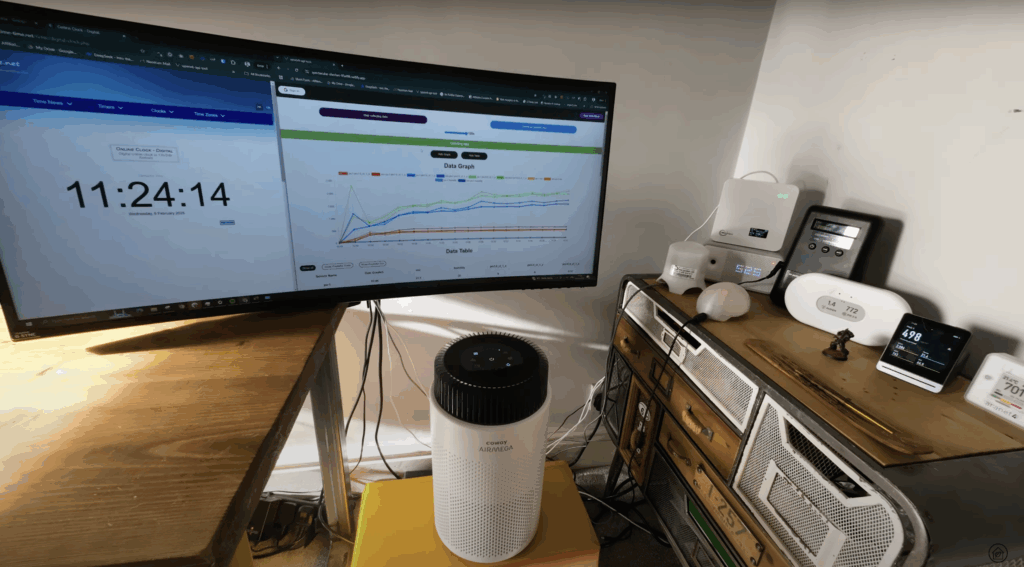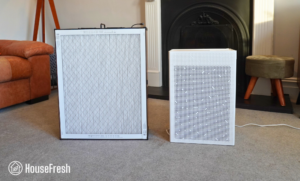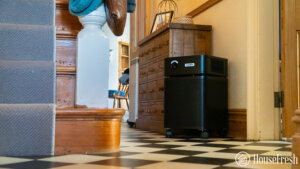When we talk about ‘Whole House’ air purifiers, there is often some confusion about which types of units we’re referring to. While most might assume this includes large air purifiers like the IQAir HealthPro Plus or Levoit Core 600S because they can clear contaminants from vast spaces, these are still classified as ‘Portable’ air purifiers.
A whole-house air purifier is a unit that installs directly into your existing HVAC system. When attached, your air purifier will use its filters to remove harmful pollutants that can plague the air you breathe, including dust, pollen and other allergens.
An HVAC (Heating, Ventilation and Air Conditioning) system pulls air through its vents. The air travels through ductwork in your home as it is heated, cooled or simply used like a fan. The air is then blown into your room(s).
When introducing an air purifier into your HVAC system, the air is passed through a series of strong filters that eliminate airborne particles, leaving fresh, clean, unpolluted air circulating throughout your home.
Whole-house air purifiers can feature a combination of filters to remove pollutants:
- Media Filters: This thick stack of professional-grade filters is installed into the ductwork of your HVAC system. The design of these filters differs from system to system, but all do the same job.
- Electrostatic Filters: Also known as UV air purification filters or germicidal light filters, they discharge concentrations of charged particles that attach to contaminants and force them to stick to other surfaces, removing them from the air. They are usually installed near the cooling coils of your HVAC system.
- Electronic Filter: These types of filters use the principle of electrostatic filters. But, instead of releasing a flurry of charged particles, they feature a network of wires that creates a constant electrostatic field to capture contaminants.
What to look for when buying a whole house air purifier
If you have a suitable space, buying a whole-house air purifier can be more effective than buying a portable one.
- It will efficiently remove harmful contaminants from all the air in your entire home without boundaries
- You won’t have to buy an air purifier for each room, which saves on money and floor space
- The filters will work constantly when your HVAC system is on
- It doesn’t emit any extra noise
If you live in a home with many rooms, a whole-house air purifier will simultaneously provide clean air to each room so that you don’t need to worry about moving a portable air purifier.
Here’s how to choose the right solution for you:
1. Consider the type of filter you will need
You must choose the kind that best suits your needs. There are three main types of filters to be aware of:
| Media Filter | Capture pollutants in a maze of tiny fiberglass filaments. They are highly effective but need replacing when they become full of the particles they’ve removed from the air. | 👉 Ideal if the air outside your home is contaminated with suspended particles like dust and pet dander. |
| Electrostatic Filter | Can produce ozone as a by-product, which can be harmful to our health. They don’t need to be replaced periodically; they only require cleaning occasionally. | 👉 The most effective at removing bacteria and viruses from the air. |
| Electronic Filter | Great at removing smoke particles that may slip by media filters. They don’t need replacing either, but they do need a lot of energy to run, so the cost to run them is more significant. | 👉 Good choice if you live in an area of smoke pollution. |
2. Consider the upfront and long-term costs
When you’re in the market for a whole-house air purifier, it’s crucial to factor in the upfront cost and ongoing operating costs. Whole-house air purifiers are commonly more expensive than portable units, so you will need to consider your budget carefully.
According to the latest data from Angi, a new HVAC unit could cost between $3,000 and $16,000. This is without accounting for professional installation costs, which could amount to $1,500 on average.
But it will all depend on the design of the system, the size of the unit, where in your home you want to install it, and other factors. And as with every other appliance, you will also be paying more or less depending on the brand you go with:
| HVAC Brand | Average Price |
| Amana/Goodman | $2,750 |
| American Standard | $3,750 |
| Bryant | $3,000 |
| Carrier | $4,250 |
| Coleman | $3,000 |
| Lennox | $3,500 |
| Magic Pak | $4,750 |
| Mitsubishi | $4,500 |
| Trane | $6,000 |
| Rheem/Ruud | $3,250 |
| York | $7,500 |
It is also worth mentioning that not all units consume the same amount of power; some will have higher energy costs than others. Also, pay attention to the expense of replacing the filters if needed. They don’t all have the same lifespan or carry the same price tag.
3. Consider whether other options could be better suited
Apart from the initial and running costs of a whole-house air purifier, you need to consider whether a whole-house air purifier is right for your home. If the contaminants come from outdoors, a whole-house air purifier is right for you. If the source of your pollution is indoors, you might be better off with a portable air purifier.
Ask yourself:
- Do you have an HVAC system installed in your home?
- Do you have the budget for a whole-house air purifier?
- Is your home the right size for a whole-house air purifier?
If you’ve checked every box, a whole-house air purifier would be the best way.
But what if a whole house air purifier is not an option?
If buying a whole-house air purifier isn’t possible for you, I recommend purchasing a portable unit for your home that will still be powerful enough to clean the air in large spaces.
I’ve picked out three of the best high-powered enough to purify the air in a large area:
| BEST OVERALL | FOR TIGHT BUDGETS | FOR LARGE SPACES | |
|---|---|---|---|
| Levoit EverestAir | Levoit Core 600S | IQAir HealthPro Plus | |
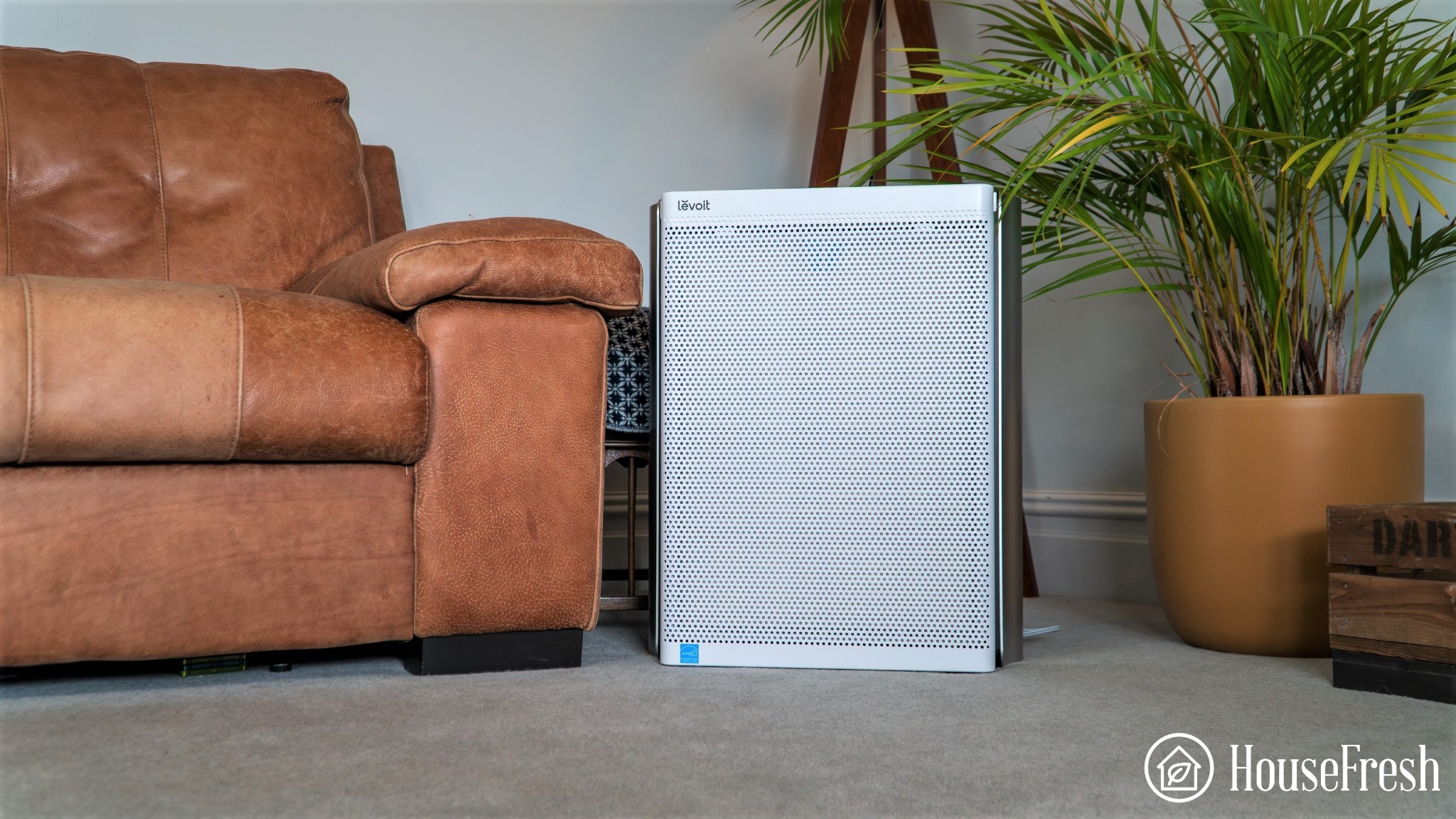 | 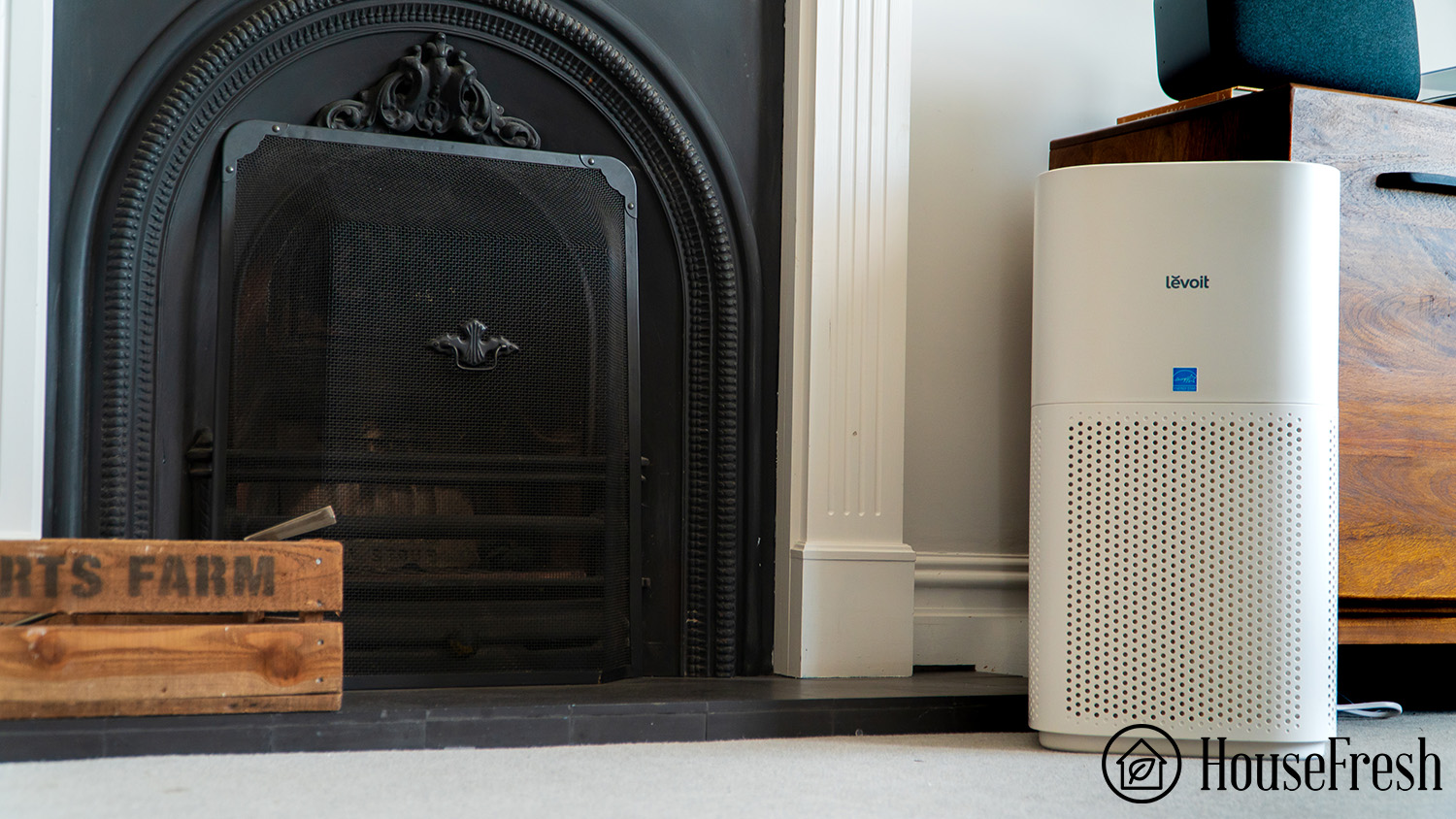 | 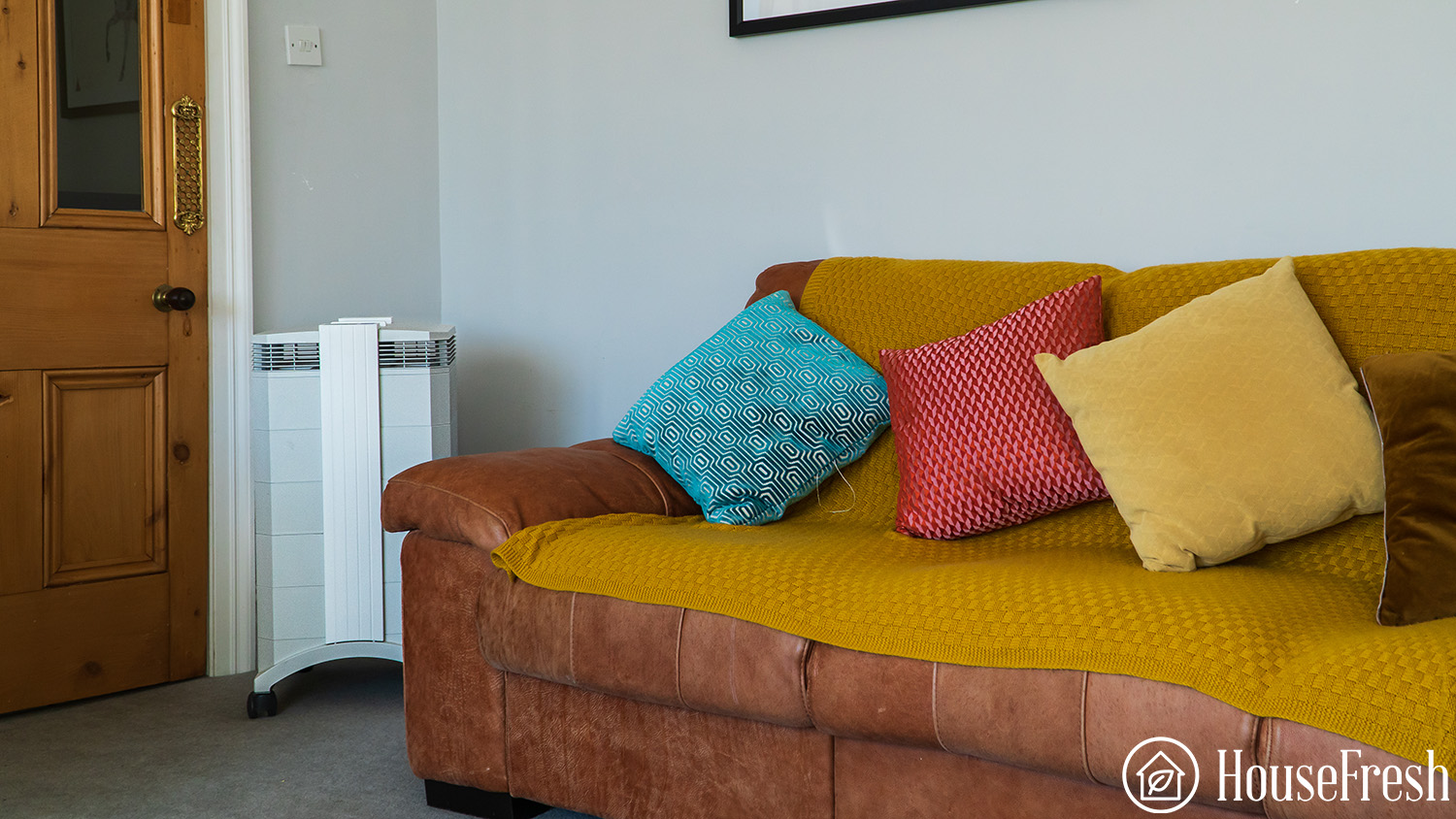 | |
| Air cleaning speed | 14 minutes | 15 minutes | 25 minutes |
| CADR | 363 CFM | 377 CFM | 250 CFM |
| Filter technology | Pre-filter, particle filter and carbon filter | Pre-filter, particle filter and carbon filter | Pre-filter, HyperHEPA and V50-CELL carbon filter |
| Max room size | 563 sq. ft. | 584 sq. ft. | 1,125 sq. ft |
| Weight | 20.7 lbs (9.38 kg) | 13.7 lbs (6.2 kg) | 35 lbs (16 kg) |
| Our review | EverestAir review | Core 600S review | HealthPro Plus review |
| Price | $182.99 | $99.99 | $748.99 |
Last update on 2025-07-05 / Affiliate links / Images from Amazon Product Advertising API
As each of you will have different-sized homes and requirements, I’ve included three excellent options to suit varying needs and budgets. Each unit has the powerful fans, filters and technology required to clean air in large spaces, so check out the complete list below.
1. Best overall: Levoit EverestAir
The EverestAir is the best Levoit air purifier I’ve tested. It looks good and it cleans the air incredibly fast.

On paper, the Levoit EverestAir looks like a powerhouse of an air purifier as it boasts a large fan and a robust Clean Air Delivery Rate (CADR) of 360 CFM, so I was excited to test it in our performance room and it’s safe to say…I was impressed. It cleared the contaminants from the HouseFresh testing room in just 14 minutes, making it the second-best-performing air purifier we’ve ever tested.
I lifted off the front grill to reveal Levoit’s 3-filter setup, which includes a washable pre-filter, a HEPA and an activated carbon filter. This thick H13 True HEPA filter will remove more than 99% of particles as small as 0.3 microns, including allergens, viruses, pollen and bacteria. The activated carbon filter will deal with cooking odors, pet smells, and VOCs.
What we really like
What we think could be better
One feature I was surprised to see was the ability to change the airflow direction with the touch of a button. With four distinct vent angles, the EverestAir allows you to direct the air output precisely where you need it in your home.
It also includes a timer, sleep mode, turbo mode and an auto mode that automatically adjusts fan speed to counter the amount of pollutants in the air. I tested this out by blowing vape smoke towards the unit. The sensor immediately detected new contaminants, set the fan to a higher speed and showed me how polluted the air was on its AQI (Air Quality Indicator).
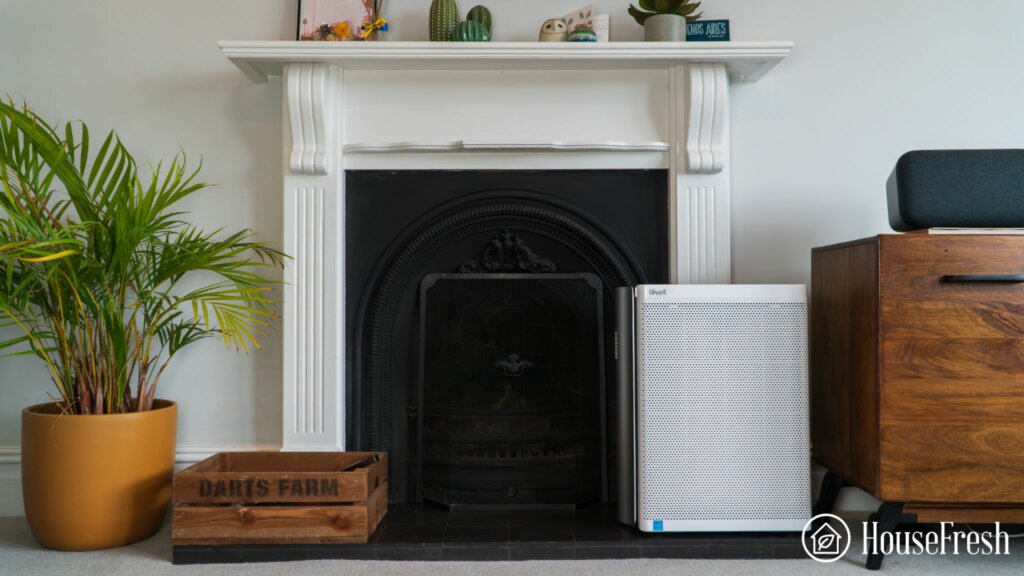
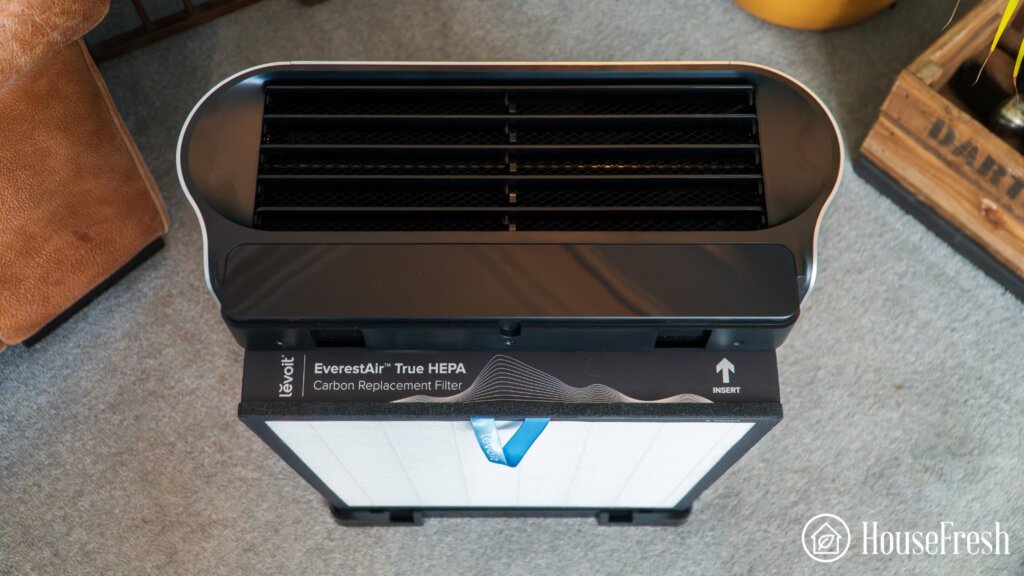
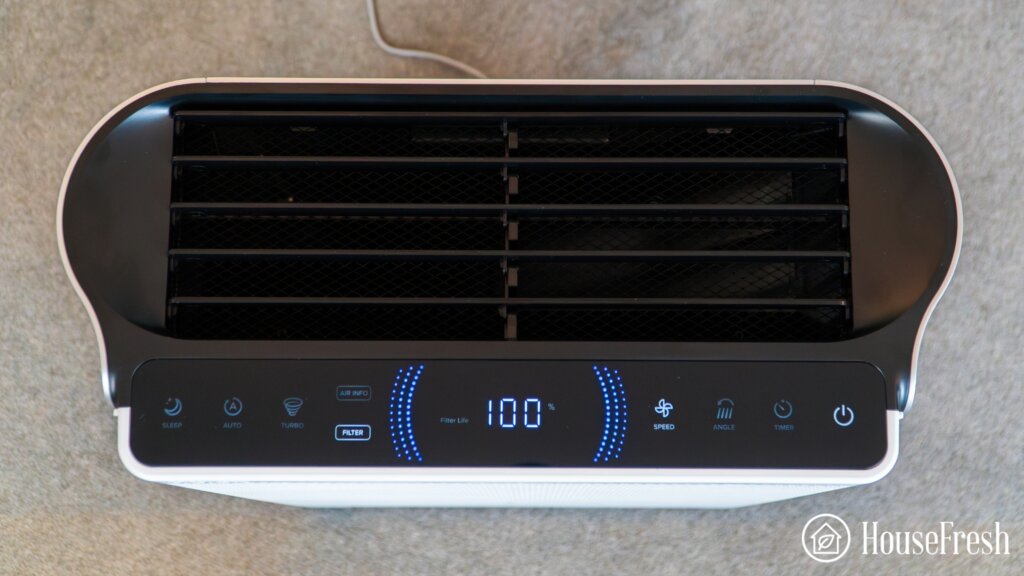
SPECS & FEATURES
| HouseFresh rating: | ★★★★★ |
| Time to clean our 728 cubic feet test room (with the device running at top speed): | 16 minutes |
| Air purifier technology: | 3-Stage Filtration (Pre-filter for large particles, main filter for airborne particles, high-efficiency activated carbon filter for odors and gasses) |
| Recommended room size (4.8 air changes per hour): | 563 sq. ft. |
| Clean air delivery rate (CADR): | Dust: 365 CFM Smoke: 363 CFM Pollen: 428 CFM |
| Dimensions (in inches / in cm): | 18.9L x 8.5W x 23.2H inches (48L x 21.6W x 58.9H cm) |
| Weight (in pounds / in kg): | 20.7 lbs (9.39 kg) |
| Filter life: | 12-15 months |
| Noise level in decibels (measured from 3 ft. away with a sound level meter): | Speed 1: 39.1 dB Speed 2: 43.2 dB Speed 3: 48.6 dB Turbo: 57.8 dB |
| Electricity consumption in watts (recorded with an electricity usage monitor): | Standby mode: 1.26 watts Speed 1: 9.85 watts Speed 2: 15.59 watts Speed 3: 26.6 watts Turbo: 69.8 watts |
| Estimated running cost (electricity consumption + official filter replacement): | $206.36 per year |
| Cost per CADR cfm (based on dust CFM as reported by AHAM): | $1.37 |
| Manufacturer’s warranty: | 2 years |
| Country of manufacture: | China |
2. Best budget option: Levoit Core 600S
This is the second best performing air purifier we have tested and it costs less than $300, offering excellent air cleaning speed for spaces of up to 584 sq. ft.
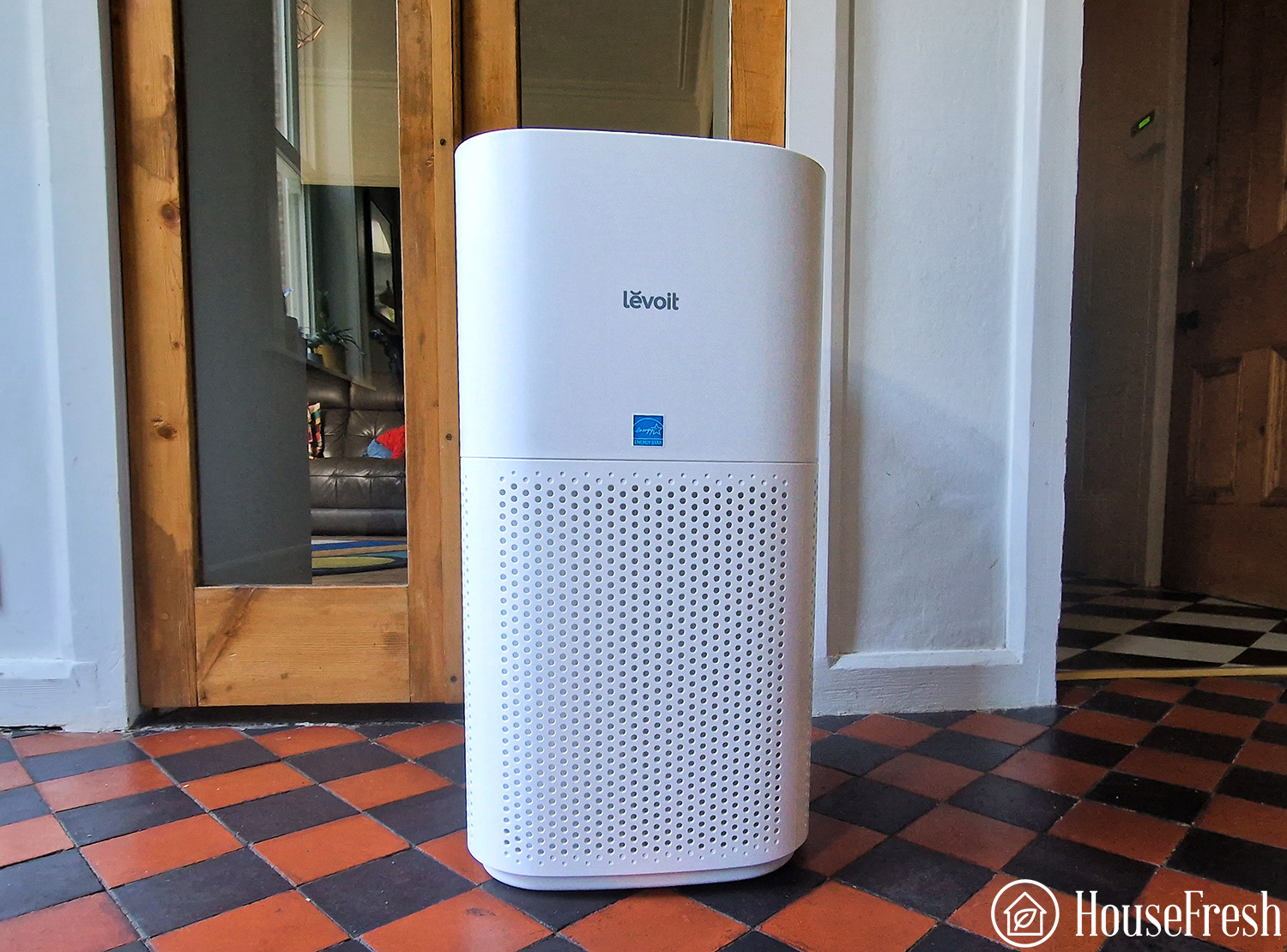
Before we bought the EverestAir, the Levoit Core 600S was the king of cleaning performance among our units. With its high Clean Air Delivery Rating (CADR) of 410 CFM combined with a powerful motor, the 600S made light work of our performance tests, is easy to use and comes with all the features I’ve come to expect from a modern air purifier.
After filling our performance testing room with simulated contaminants, the 600S managed to eliminate them in an outstanding time of 15 minutes at its highest fan speed. When I compare this to some of the other air purifiers we’ve tested, you can see why it’s so impressive.
Their trademarked VortextAir fans allow the unit to draw in vast air from the room through a top-of-the-line H13 True HEPA filter with activated carbon pellets wrapped in a pre-filter, eradicating even the smallest particles.
What we really like
What we think could be better
With a host of smart features, including a timer, sleep mode, display lock and an auto mode that uses the unit’s in-built sensor to monitor the air quality in your room and automatically adjusts its fan speed accordingly. The 600S also uses this data to display your air quality numerically and through an LED light color wheel.
SPECS & FEATURES
| HouseFresh rating: | ★★★★★ |
| Time to clean our 728 cubic feet test room (with the device running at top speed): | – 16 minutes (top speed) – 32 minutes (sub-45 dBA speed) |
| Air purifier technology: | Pre-filter, particle filter for airborne particles and activated carbon filter. |
| Recommended room size (5 air changes per hour): | 559.5 sq. ft. |
| Clean air delivery rate (CADR): | Dust: 373 CFM Smoke: 377 CFM Pollen: 437 CFM |
| Dimensions (in inches / in cm): | 12.3 x 12.3 x 23.6 inches (31.3 x 31.3 x 60 cm) |
| Weight (in pounds / in kg): | 13.7 lbs (6.2 kg) |
| Filter life: | 6 months |
| Noise level in decibels (measured from 3 ft. away with a sound level meter): | Speed 1: 40.9 dB Speed 2: 45.9 dB Speed 3: 61.4 dB |
| Electricity consumption in watts (recorded with an electricity usage monitor): | Standby mode: 1.53 watts Speed 1: 7.92 watts Speed 2: 11.35 watts Speed 3: 21.15 watts Speed 4: 49.27 watts |
| Estimated running cost (electricity consumption + official filter replacement): | $174.71 per year |
| Manufacturer’s warranty: | 2 years |
| Country of manufacture: | China |
3. Best for larger spaces: IQAir HealthPro Plus
This Sweadish-made air purifier is one of the top units on the market and is perfect for spaces as big as 1125 sq. ft.
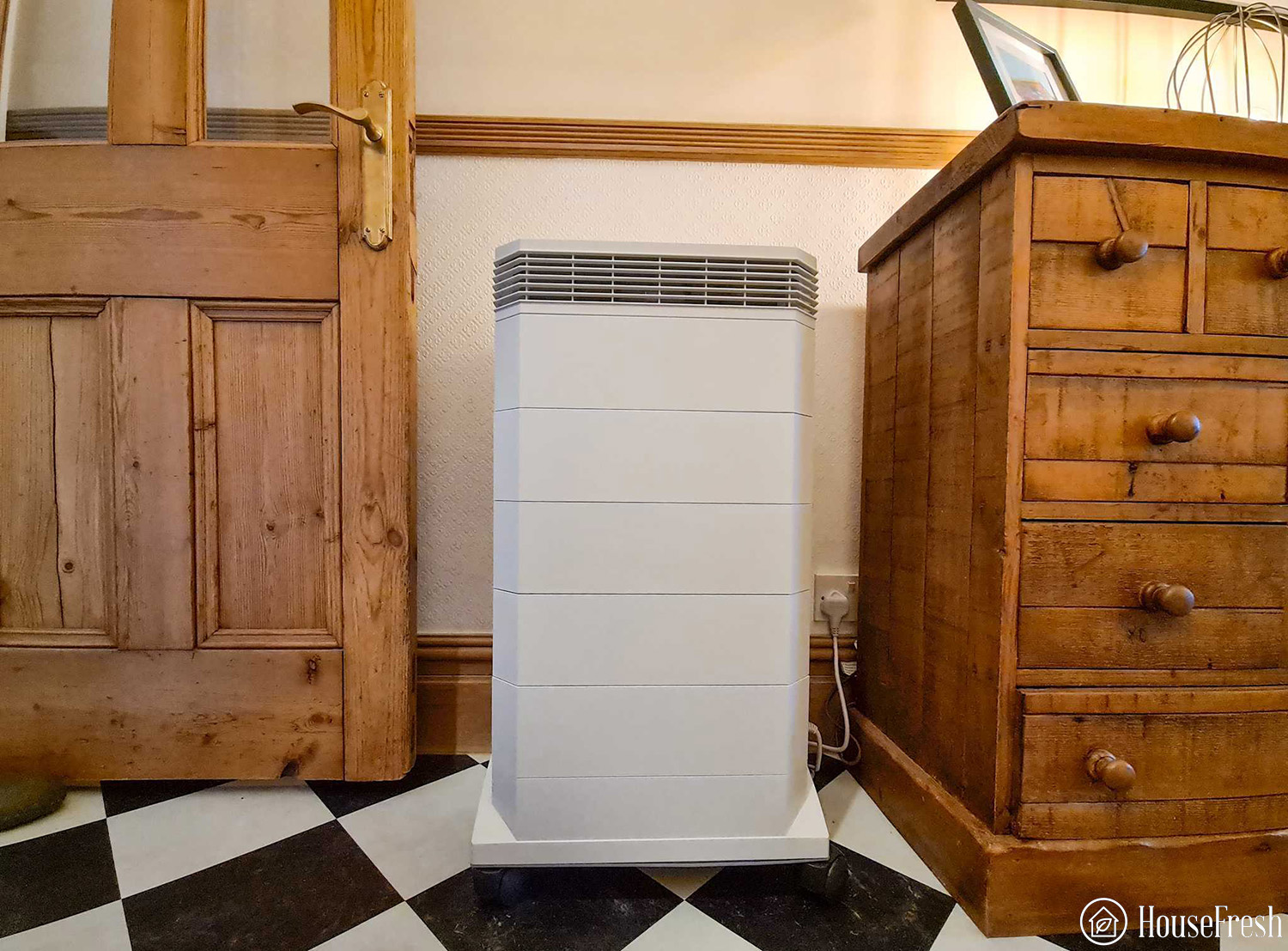
If you have a larger space to clean, check out the HealthPro Plus from IQAir. This Sweadish-made air purifier is one of the top units on the market and will offer true peace of mind that your home will be protected from pollutants. When Danny (Founder and Senior Writer) saw this beast of a unit, he bought it with zero hesitation.
What we really like
What we think could be better
When I first lifted off the top to take a closer look at the HealthPro Plus’s filters, I found three stages of protection. The first is a Pre-Max Filter tackling larger particles such as hair, dust or lint.
The second is a V5-Cell Filter that contains over 5 lbs of Activated Carbon, and I’m not talking tiny pieces; there are actual chunks of carbon packed into these filters to capture VOCs, chemicals and odors from the air. HealthPro Plus contains the most activated carbon I’ve ever seen in an air purifier.
This third was IQAir’s patented HyperHEPA filter, whose innovative design goes above and beyond what you will find in other purifiers, removing 99.95% of ultrafine particles down to 0.003 microns in size.
It may not be as fast at clearing contaminants as the two Levoit units above, but with its vast size, it can clear rooms up to 1125 sq. ft., making it our top recommendation for those of you who have an ample space to clean.

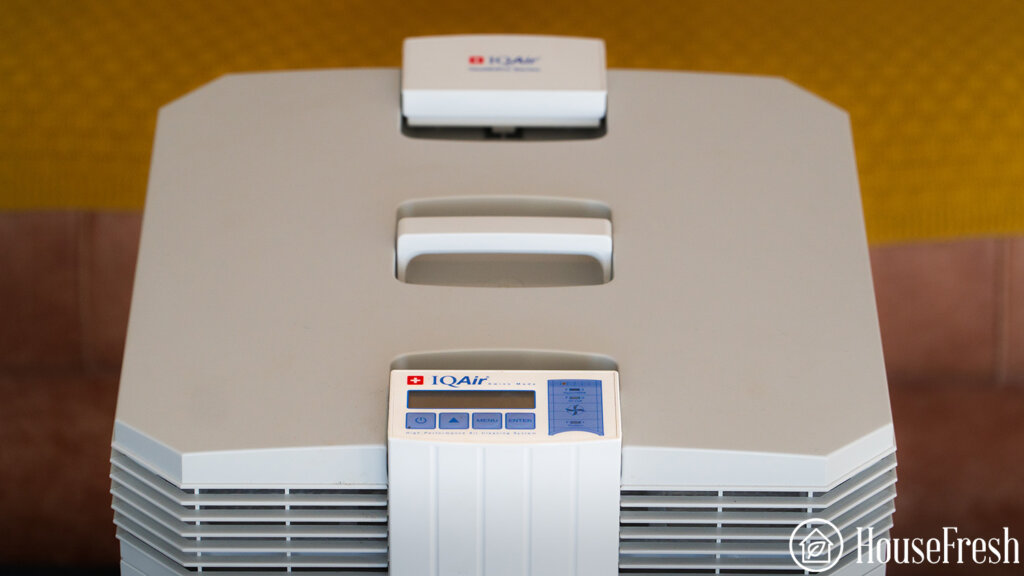
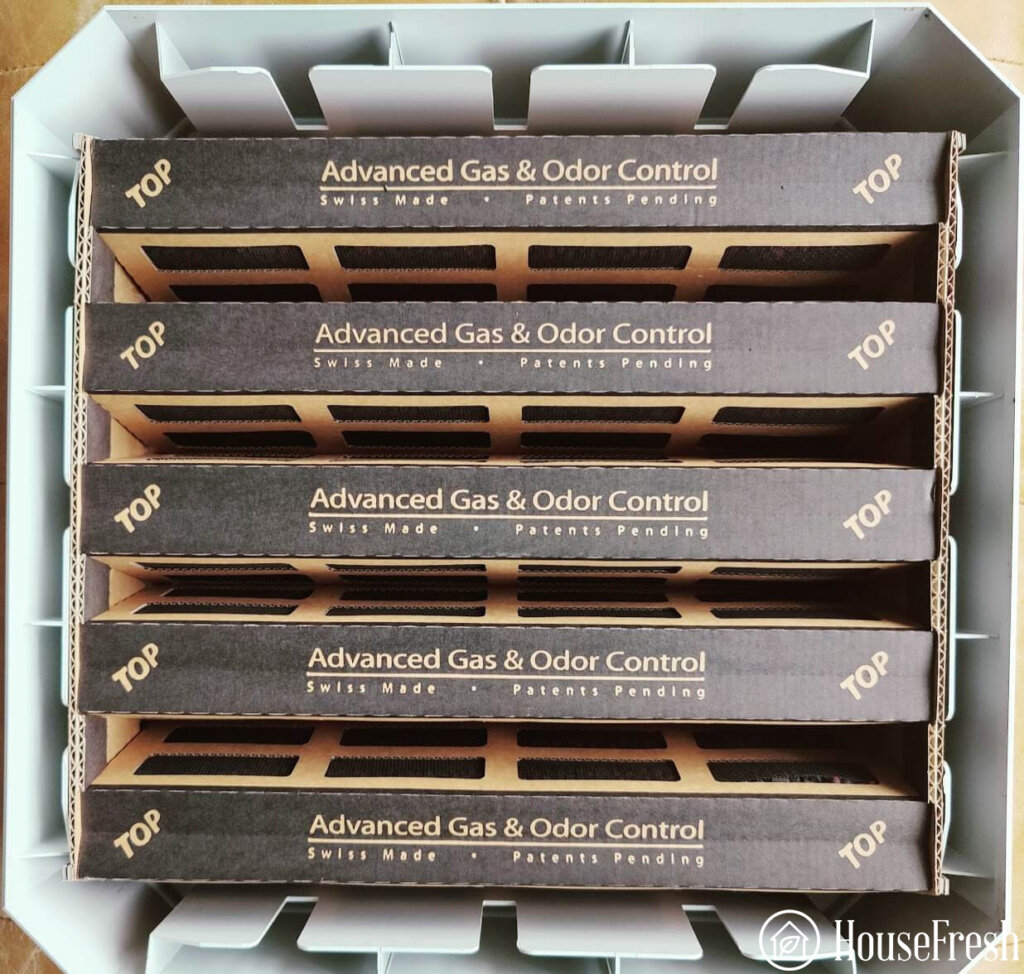
SPECS & FEATURES
| HouseFresh rating: | ★★★★★ |
| Time to clean our 728 cubic feet test room (with the device running at top speed): | 28 minutes |
| Air purifier technology: | HyperHEPA and V50-CELL gas and odor filter |
| Recommended room size (5 air changes per hour): | 375 sq. ft. |
| Clean air delivery rate (CADR): | Estimated: 250 CFM |
| Dimensions (in inches / in cm): | 28H x 18W x 16D inches (71H x 38W x 41D cm) |
| Weight (in pounds / in kg): | 35 lbs (15.88 kg) |
| Filter life: | 4 years |
| Noise level (measured from 3 ft. away): | Speed 1: 36.9 dB Speed 2: 37.2 dB Speed 3: 40.9 dB Speed 4: 47.2 dB Speed 5: 53.9 dB Speed 6: 61.2 dB |
| Electricity consumption in watts (recorded with an electricity usage monitor): | Standby mode: 1 watts Speed 1: 16.5 watts Speed 2: 32.7 watts Speed 3: 47.3 watts Speed 4: 69 watts Speed 5: 94.3 watts Speed 6: 145.2 watts |
| Estimated running costs (electricity consumption + filter replacements): | $421.47 per year |
| Cost per CADR cfm (based on dust CFM as reported by AHAM): | $3.60 |
| Manufacturer’s warranty: | 10 years |
| Country of manufacture: | Switzerland / Germany |
Wrapping up
Whole house air purifiers are great if you have an HVAC system installed in your home. They have the ability to filter contaminants from the air that gets circulated into your rooms. They are great if you live in a highly polluted area. But they are expensive to buy, install and operate, so make sure you’ve calculated all the running costs first.
The simple answer is no; they have a similar objective but use different methods to achieve it.
An HVAC filter is installed to remove particles from the air that it pumps into your entire home. These filters are designed to stop larger particles from passing through but aren’t the strongest at removing the smallest particles that can enter your home, like bacteria & viruses.
A central air purifier is designed to clean the air of a specific space. Air purifiers that use high-grade HEPA filters can remove up to 99.99% of airborne particles.
Yes, if you have the budget.
If you live in an area with a high amount of outdoor pollution (e.g., If you live in a city, by a busy road, by a factory), an air purifier in an HVAC system will significantly reduce the number of airborne contaminants that enter your home by removing them with its filters.
It all depends on what you need it for.
Whole house air purifiers are able to filter pollutants from outdoor air blown throughout your home utilizing only one unit installed in an HVAC system. Unfortunately, they are only active when the HVAC system is turned on.
Portable air purifiers concentrate on removing contaminants from indoor air in specific spaces. They usually come with highly efficient HEPA filters, and some have extra features like auto mode and air quality monitoring. The downside is they are designed to work in one room at a time.


